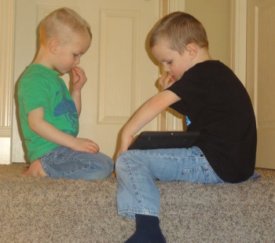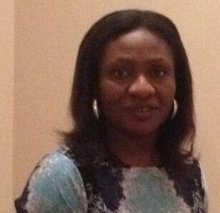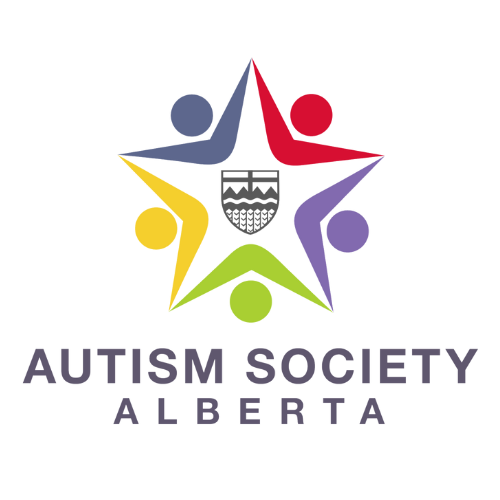My Kids Get It
 I always get a little bit of a funny look when I say how many kids we have. These days a family with four children isn’t quite as “normal” as it used to be, and with them all being within two years of each other, we are a very busy bunch.
I always get a little bit of a funny look when I say how many kids we have. These days a family with four children isn’t quite as “normal” as it used to be, and with them all being within two years of each other, we are a very busy bunch.
I used to feel like I needed to explain the size of our family, or justify why we would have more children even after David was diagnosed with ASD. Were we being fair to him? Were we being fair to the other children? David is on the severe end of the spectrum, so yes, he takes up a lot of time. But over the last year or so I have started to see why our family is perfect in its size, how each child was so very meant to be. I never questioned that we loved and wanted all of them, but occasionally I would wonder, was I being fair? Was there enough of me to go around?
My children are never without a playmate, or a role model. Watching my two smaller children grow and play has been amazing: they are so creative and enthusiastic when they talk and share ideas. But watching my two-year-old role model language and social interactions and then praise her brother because he said “Hi” is amazing. She is going to be a leader – she already is.
I remember watching my four-year-old see his brother really melt down for the first time in public., he had seen it a million times before but he was really seeing it, he was starting to own it. When his friend looked to him to say, “What’s wrong with your brother?”, Callum simply looked at his friend and said, “David’s autismal, he will be done in a minute…” No, that’s not a typo, and no, I did not correct him. He’s going to be an understanding adult who will see past other differences and into the heart of the person – I was and am so proud.
My oldest daughter really struggled when David was first diagnosed, because he was her lifeline. He did all the talking, he understood her, and then one day he was just gone. The other day at the park I noticed how she always checks on him and promptly cheers him on whenever he follows the rules. She is the first to hold his hand, and will sit for the longest to listen to him read. She is an incredibly caring little girl, and she is so sensitive to others.
About a month ago during what is the most crazy time of day, bedtime, I realized just how bonded and amazing our family is, even if we are not all super verbal. Emma-Lea, our youngest, needs to be sung to each night, and David needs a lot of attention at this time of day. One particularly frustrating night, we allowed him into her room so he could sing to her. A simple prompt to first sing Twinkle and then Mommy Helps changed the way we looked at their relationship. He started to sing in his beautiful little voice that we so rarely hear, and Em froze as she lay down with wide eyes and soaked up every sound that was coming out of David’s mouth, because she knew he was singing for her. He sang the entire song, kissed his sister, and took me by the hand. David is an amazing little boy, sensitive and smart, and capable of being there for his siblings just like they are for him.
We are a big, noisy, silly, BUSY family, and I just love it! My children are growing up learning about being different, and how that’s OK. They will be able to see past a person’s disability to see their true potential, and they will be strong advocates and caring adults. David is forced out of his world by people who love him unconditionally and accept who he is. I know without a doubt that the best thing that I have ever given to my children was each other.
Building Empathy With Future Educators
Last week I had the chance to chat with a group of forty University of Alberta Middle Years Education Students. Initially I was a little apprehensive: while my Matea is one of my favorite people to celebrate and respectfully share about, in my professional life I talk with 6th graders, not adults.
In conversation with the Inclusive Education Instructor, psychologist Krista Schultz, her vision for the forty-five minute presentation was to build empathy and realistic understanding from these new teachers about families and special needs children.
I was welcomed by a group of students ranging in age from 21 to 45 years, and they actively participated in a presentation that was supposed to take 45 minutes, but ended up lasting well over an hour and a half. In the spirit of building empathy, we discussed specialized services and the hard work families put in to learning how to support their child, I spoke to them about how long it takes me to get Matea ready in the morning for school and ensure she is calm and regulated when she starts her day, and how pressing snooze on the alarm just one more time is not an option. I explained to them the delicate dance that is parenting siblings of a child with autism, and we talked about sleep – sweet, unattainable (sometimes) sleep.
The students were able to view pictures of Matea’s family and friends, and watch video of her participating in a poster presentation in her Kindergarten class last year. My non-verbal girl presenting her poster – it was the epitome of inclusion. They asked insightful questions: what do you do when you are mad at the school? Take a breath, and remember that I need to work in team with these people, and being mad at them is not the best way to get things done. Aren’t you tired? Yes, always. You would be tired too if you had three kids; lots of parents are tired. Is it hard always trying to make things easy for Matea? I am not in the business of making everything easy for Matea, and I mean that in the nicest, most loving way possible. I am in the business of supporting her, teaching her and helping her to LOVE herself and be the best version of herself she can be.
I think the most powerful moment in the presentation came when I told them how much we love Matea, how we love her beautiful differences, and how she has taught our family what is truly important. We have met AMAZING and supportive individual and families. I asked them to remember Matea the next time they were entering a parent-teacher conference with a family with a child with special needs and thinking to themselves “What are they doing at home? Why aren’t they doing anything at home?”, and remember we are doing LOTS, and we have been for years.
"Fall Into Fun" Family Festival
On a sunny Saturday afternoon in mid-September, 225 families and friends of Aspire Special Needs Resource Center gathered to celebrate the end of summer!
Through donation and sponsorship from around Central Alberta, Aspire was able to offer families an opportunity to enjoy spending time with one another, and continue building a foundation of support within our own special needs community.
While children bounced in bouncy houses, listened to music, and participated in many adapted activities, parents and friends enjoyed the sunshine and took the chance to connect with old classmates and make new friends.
Most importantly, all those in attendance had the chance to meet Red Deer firefighters, and RCMP members one on one in a fun and relaxed environment. Children and adults were welcome to explore the fire engine, try out the fire hose, and go for a ride in an unmarked RCMP car (some lucky children even got to steer and use the loudspeaker in the cruiser). For my own daughter, Matea, it was a chance for her to interact with Emergency Services personnel. As a family we have ALWAYS been scared about what would happen if we were in a car accident or there was fire in our home. We have documentation in our vehicle fastened to Matea’s seat so that first responders would know that she has autism, is non-verbal, and will likely run away. These and other precautions are great, but supporting her while she interacts with emergency response workers, is invaluable – for her and them. She also LOVED the fire truck, so I feel that if there was an emergency, she would be quite content to hang out in one!
Getting out and participating in community events can often be difficult and overwhelming for families with children on the spectrum. The outdoor location at Joseph Welsh Elementary School and varying activities made this event easily accessible to many families.
Events like the Fall into Fun Family Festival facilitated by Aspire Special Needs Resource Center give families touched by special needs a unique opportunity to enjoy each other’s company in a relaxed environment free of judgement.
Raising a child with autism can be lonely, but as soon as you meet someone who “gets it”, it’s transforming. – Melody Cameron
New Initiatives From Autism Canada
I’m One is a Federal Election Campaign to make sure autism is a priority for every candidate looking to get elected on October 19 – and you can help. Please consider hosting a coffee meeting with your candidates and share how it went with Autism Canada. They have made it easy to find your candidates and have materials to help with every step of the way. They will be sending all candidates a package so they are ready for your call and understand a little more about autism. Check it out at http://bit.ly/1KHuyiq
ASD Central is an online forum for adults on the spectrum to come together to share, ask questions and get advice from each other. If you are on the spectrum and are able to join the conversation, we want to hear from you. Whether it is current affairs, employment, relationships or other topics of interest, there is something for everyone. http://www.autismcanadaforum.org
We Want to Hear From You!
My Son Will Be An Adult?!
 It seems like yesterday that we met for the first time with the popular Edmonton specialist, Dr. Keith Goulden. For years, Dr. Goulden has travelled to Fort McMurray to help parents like us with diagnoses. The day of our meeting, we couldn’t wait to get his take on things. That day, our son Lukas was diagnosed with Autism Spectrum Disorder at 2.5 years old – that was nearly 8 years ago.
It seems like yesterday that we met for the first time with the popular Edmonton specialist, Dr. Keith Goulden. For years, Dr. Goulden has travelled to Fort McMurray to help parents like us with diagnoses. The day of our meeting, we couldn’t wait to get his take on things. That day, our son Lukas was diagnosed with Autism Spectrum Disorder at 2.5 years old – that was nearly 8 years ago.
Panic was a great motivator for me to be the best advocate for our child I could possibly be. Quickly, it was clear to me there was no support system for parents or extracurricular programs for my child here. That gap had to be filled somehow.
I began to look into what I could do as a parent. Over the years, I worked to establish the Fort McMurray Autism Support Group and founded Camp “Kids First.” Recently, I decided to step down. The board and its rapidly growing families here were more than capable, and were just as passionate as I was to carry on this support group and program in the community long term for our children.
In a recent conversation with a group member, friend and ASA board member, she mentioned that a group called Act Now for Adults with Autism meets regularly in Edmonton. That was when it suddenly started to sink in: my son would be an adult one day. The concern for our son’s future hit again. My son is ten years old, nonverbal, and an only child. Over the years I have heard so many families’ stories about struggling to advocate and navigate for housing, education, respite and finding an experienced autism doctor for adults. (What? I won’t get to see my angel in disguise, Dr. Goulden, anymore once Lukas is 18?) I hadn’t given a lot of thought to all of the other issues we will encounter when my son is an adult. Will Lukas still have that light in his eye as an adult when I’m gone? Will he have the care, support and understanding he has now when he is an adult?
Straight away I contacted Deborah Barrett from Act Now for Adults with Autism to find out more about the work this group is doing. Act Now for Adults with Autism has been together for years and has made some great strides in making a difference. This likeminded group meets regularly to work as a team for a brighter future for young adults and their families. So much more is needed if children like Lukas are to have a quality of life they deserve after they are done school. I am aware that the current group members, whose children are all adults, continue fighting for their vision for the future. My eyes are now wide open, and I view Act Now for Adults with Autism as a group I can learn from as well as contribute to. There is much work to be done, and I am here to support Act Now for Adults with Autism any way I can. Thank you to all of those group members for your forethought on behalf of our children and their families.
Autism Spectrum Disorders and the Criminal Justice System

There is no evidence to suggest that people with ASD are more likely than non-ASD individuals or the general population to commit crimes. In fact the evidence is that they are more likely to be victims of crimes than offenders.
Poor social awareness, social naiveté, intellectual impairments (which are not necessarily associated with all individuals with ASD) and other vulnerabilities may make people with ASD prone to being victimized by others.
Having to deal with the CJS can be very stressful for anyone, and people with ASD can find this more stressful than non-ASD individuals. Apart from the communication challenges that come with ASD, this may also be due to the high levels of anxiety experienced by individuals with autism.
Certain characteristics people with ASD possess can make them more likely to be found in conflict with the law. These characteristics usually arise from the domains of their deficits or impairments, such as impairments in social interaction, impairments in social communication, exhibiting certain stereotypical or repetitive behaviors, having special interests, and experiencing certain sensitivities.
People with ASD may find themselves being witnesses to crimes, and therefore being faced with the need to testify in court to assist the court in executing justice.
An understanding of the disorder is therefore highly essential for professionals involved in various aspects of the CJS (police, lawyers, crown prosecution, courts and judges) in order that people with ASD have a fair experience of the CJS. This should be considered at police interviews, when considering whether to charge or not to charge an individual with ASD with a crime, when aspects of the individual’s presentation may affect his ‘fitness to stand trial’, when giving testimony, and when sentencing options are being considered.
It is also very important that people looking after or in close relationships with individuals with ASD help them seek support during times when they are facing the rigors of the CJS.
Dr. Funto Orimalade, MBBS MRCPsych LLM
CCT Forensic Psychiatry (UK)
Forensic Psychiatrist
Special Interest in Intellectual Disabilities and Autism Spectrum Disorders
Forensic Assessment & Community Services (FACS)
10225 106 Street
Edmonton
Alberta T5J 1H5
Autism Entrepreneurs – Good for Edmonton
What Do We Know About Improving Employment Outcomes for Individuals with Autism Spectrum Disorder?
Autism spectrum disorder (ASD) is the most commonly diagnosed neurological disorder in children. Adults with ASD have some of the poorest employment outcomes in comparison to others with disabilities. While data in Canada is limited, roughly 25 per cent of Americans living with ASD are employed and no more than six per cent are competitively employed. Most earn less than the national minimum hourly wage, endure extended periods of joblessness and frequently shuffle between positions, further diminishing their prospects. Poor employment outcomes result in lower quality of life and often lead to steep economic costs. Governments are wise to pay attention to the poor employment outcomes as the high numbers of children now diagnosed with ASD will become adults in the future in need of employment opportunities.
Improving employment outcomes for those living with ASD is an important policy objective. Work opportunities improve quality of life, economic independence, social integration, and ultimately benefit all. Adults with ASD can succeed with the right supports. Fortunately, there are many emerging policy and program options that demonstrate success.
The Connect Event
This is a needs assessment concerning students with disabilities and their related social skill challenges, who are transitioning to postsecondary education. This includes individuals with Autism, ADHD, PDD, Social Anxiety Disorder, Personality Disorder and Learning Disabilities.
Parents, students, educators, support agencies and employers are invited to attend this event. Reserve your place by October 8. Click here to register.
Want to Be Part of a Movie?
A video of comments from this gathering and further interviews, will be released on October 17, 2016. Inclusion in the video is based on your consent.
For more information, e-mail connectevent2015@gmail.com










